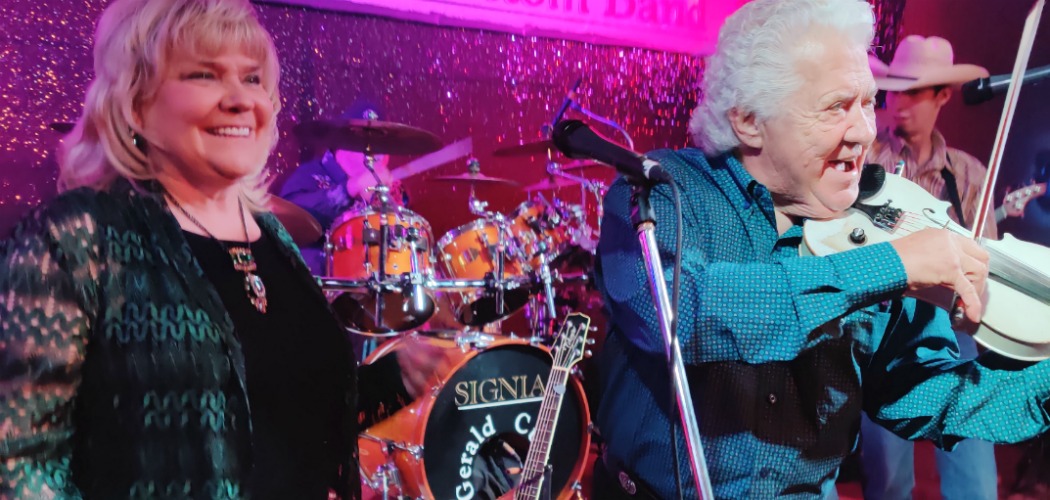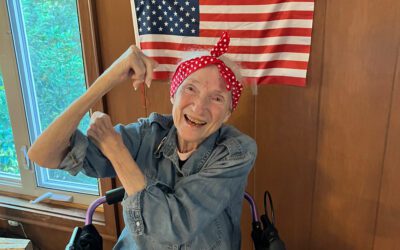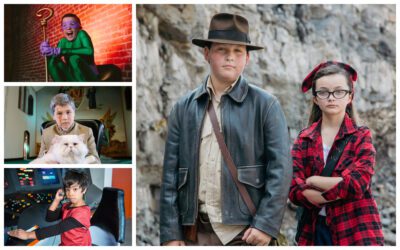[title subtitle=”WORDS Dwain Hebda
IMAGE Dwain Hebda and courtesy Patsy Brewer”][/title]
“The bar is open,” sounds a clear, melodic voice, not quite a yell, but more than plainspoken, smooth as whiskey running out of a glass. “The. Bar. Is. Open.”
The sound emanates from Jimmy Doyle (whose actual last name is Brewer but hardly anyone, it seems, uses it). Jimmy’s looking resplendent in a turquoise shirt, jeans and high-dollar cowboy boots, but the thing you notice first is the mane of white hair, the shine of which even eighty-plus years and a lifetime in the music and bar business couldn’t dull.
Through the chatter and clinking of glasses and the house band’s pitch-perfect renditions of country gold, the clarion call to the bar lands soft as cigarette smoke curling skyward. Yes, you can smoke here at Jimmy Doyle’s Country Club at the Galloway exit of North Little Rock, Arkansas. Not only is it OK to drink here, it’s all but mandatory. Not because anyone said so, but because it feels like the right thing to do.
Some couples are scattered throughout the big space around the dance floor, a table of ladies on a night out are looking to get loud and neon tints the whole scene. It’s Saturday night and time for honky tonkin’, a unique and rapidly disappearing brand of American entertainment. But as the wry name of the place implies, if rich folks can have their country clubs, so should the working man.
And that’s where Jimmy Doyle’s place comes in; a sanctuary frozen in time beyond where the dictates of political correctness and natterings over little vices like cold beer or a few smokes can reach. As the rail-thin cowpoke fronting the band tonight growls a la Charlie Daniels, “If you don’t like the way I’m livin’, why don’t you leave this long-haired country boy alone.”
The bar is indeed open. Where else in the world would you want to be?
***
Country music is the last surviving oral tradition of American culture, a history primer set to steel guitar. The genre chronicles many facets of the human condition – love, loss, rage, redemption. You don’t have to be a fan to appreciate the music at its best, nor do you need a degree to understand it. At its heart, it tells the stories we all live and can relate to.
Jimmy Doyle Brewer was made for country music like a mule was made for kicking. Every phase of hisremarkable life seems pulled from the lines of a George Jones tearjerker or a Buck Owens romp with just enough Johnny Paycheck outlaw charm to stir the pot.
Like a lot of the old-timers, Jimmy got into music not because he’d planned to, but because he wanted to get the hell out from under his childhood circumstances.
“We were called farmers and it was true,” he says. “Growing up and picking cotton for a living, hoeing. Oh, you had to hoe the cotton back then. There wasn’t no such thing as a cotton picker. You picked it all by hand.”
Doyle grew up in a place his kinfolk founded – Brewer Bottoms – out on the Grand Prairie. He attended school locally through the sixth grade then caught a bus for the long daily ride to DeWitt, twenty-eight miles away. He’d attend both DeWitt and Stuttgart until a high school teacher ridiculed him in class for asking a question. He walked out and never looked back.
Jimmy’s upbringing was as chaotic as it was lean. Born the youngest of ten kids in Depression-era Arkansas, hardscrabble doesn’t begin to describe it. His parents split up when he was still a boy, a situation he describes with a line so lyrical you could build a song around it.
“My momma left,” he says. “I don’t blame her.”
Lillie Mae Watkins moved to Little Rock, but she didn’t exit Jimmy’s life. In fact, she bought him his first guitar, just one of the musical gifts he got from her side of the family.
“My uncle was a fine guitar player and everybody on my mother’s side, was musical,” he says. “My grandpa, he was a fiddle player. My aunt and my uncle, they sang. My mother, she didn’t play no instruments, she liked to dance too much. Anyway, that’s handed down to me, you know.”
His father’s contributions to his life were much different than his mother’s – Jimmy recalls working in the “family business” of moonshining that included making deliveries pulling a red wagon as a boy and outfoxing the revenuers on horseback later on. He didn’t do it for laughs, to get rich or be a badass. The Brewers, like a lot of farm families back then, were just trying to survive.
“I was born in ‘36 and we had eighty acres back there, only about twenty was cleared for farming, so it wasn’t a big crop,” he says. “That’s where the moonshine came in.”
***
The waitresses at Jimmy Doyle’s are schooled in the art of navigating tables in the dark, spotting beers running low and doing something about it.
“You need another’n, hon?” they ask. You nod and they whisk away the empty.
When the new one gets there, full and frosty, the Arkansas River Bottom Band hits an opening note that brings Jimmy to the stage. White fiddle in hand, he works the crowd with some fiddlestick humor that flirts with dirty but doesn’t go all the way.
He touches the bow to the strings and a sound pure and joyful sprays out of the speakers. It’s an uncharacteristically sparse crowd tonight but those who are here rush the dance floor. He makes George Jones’ “The Race is On” look effortless, mugging with the tight band and cutting up between songs.
“I went to the doctor and I said ‘Doc, I have a problem.’ He said, ‘Well, what is your problem,’” Jimmy tells the crowd. “I said, ‘I have a BM about six o’clock every morning.’ He said, ‘Well that’s good.’ I said, ‘Noooo; I don’t wake up ‘til about seven.’”
***
Jimmy learned to perfect his patter and musical chops in the Navy. He made three far east cruises, one around the tip of South America and one to the Arctic Circle and every port they pulled into, he’d find a bar and play his music. While on board ship, he and his group, The Hayseeds, entertained their fellow swabbies. When he got out, it was music or moonshine and it didn’t take much to decide which.
“Yeah I liked to play and I liked to sing,” he said. “And, I’d got tired of outrunning the revenuers.”
He made his way to San Jose, California, and started playing clubs and backing the famous acts that came through. Over time he’d cut a record or two and hosted a local TV show which earned him some fame. From there he worked Reno and Vegas back when they were still the wild west. Someone nicknamed him The Arkansas Wildman for his antics onstage and off, a tag he readily admits was apt.
It would be easy to describe Jimmy’s wife, Patsy, in the words of Waylon Jennings – “a good-hearted woman in love with a good timin’ man,”– but that sells her short. Raised in Humnoke, Arkansas, the rural equivalent of the same neighborhood, she knew early of the Brewers and the services they provided.
“My dad was a farmer and [Jimmy’s] dad used to sell my dad whiskey,” she says.
Patsy grew up similarly talented and poor as Jimmy, leaving home early in life to live on her own in North Little Rock while working and playing local gigs with her singing group. At the recommendation of her mother, who’d seen Jimmy do his thing on a morning TV program, Patsy pulled some girlfriends together to go catch the show.
“When you’re in the crowd and you sing, they’re gonna try to put you on stage whether you want to or not,” Patsy says. “All of a sudden, I’m singing up on stage with him. He musta liked what he heard because he called me in a week.”
Jimmy had a show coming up in Monroe, Louisiana, and he invited Patsy along. She went, and despite a twenty year age difference (the trip to Louisiana happened when she was just seventeen, “something you could never do today,” she says) they’ve been together ever since.
Patsy started singing at age five, in church, then graduated to small-town celebrations called hootenannies. That led to gigs in bars, first accompanied by older relatives and later just by an altered ID that got her in the door.
“That made me feel big, when I’d see my name on the fliers,” she says. “But the kids, when you get up into your teenage years, can be quite cruel when you sing country music. You get a little backlash from that and I was kind of bashful anyway.”
At that, she flashes a million-dollar smile rivalling the diamond ring on her hand.
“Kinda hard to believe, huh?”
***
You get up to stretch your legs and realize how big the club is with a poolroom in the back and a whole second level that doesn’t even get used much anymore. There used to be places like this everywhere in Arkansas, everywhere in the country, in fact; local joints by the interstate that gave musicians passing through a place to play, pay their dues and pay their respects.
On two large bulletin boards, Patsy has archived volumes of photos, posters and various knick-knacks accumulated through the years. There’s a poster for David Allen Coe who still plays here, a photo of Travis Tritt and Alan Jackson up on stage and of Toby Keith who sat in for an impromptu session one memorable night. That hardly even scratches the surface of her collection.
Back in the early days, Jimmy opened for or worked with Buck Owens, Wynn Stewart, Merle Haggard and Freddie Hart during his California period. He and Tammy Wynette watched George Jones perform from the wings of stages; while doing standup in Las Vegas, he hung out with Red Foxx.
He says he’s worked with everyone he ever wanted to play with except, ironically, Arkansas native son Glen Campbell. Today, he and Patsy talk about those entertainers like the family friends they are or, as is increasingly the case, remember them for what they were.
Back on stage, Jimmy and Patsy run through a couple of songs then he turns things over to her and heads to the dance floor, toasting friends and hugging the pretty young things who want a photo. Those kinds of human connections they credit for their longevity, thirty years in this spot, but the same wherever they’ve been.
“It’s the people, I think, is a lot of it,” Patsy says. “We’ve got a lot of regulars and they’re most of the time here every weekend. And then with the Interstate, we get a lot of different people in here that we get to meet and talk to. The people keep you going.
“We talk about retiring and everybody is like, oh no you’re not, you’re not gonna retire. Well, what are y’all gonna do when we’re outta here, you know? But I don’t think we’d be happy retired.”
For Jimmy’s part, the formula is simple – mingle with your clientele and whether you make ‘em laugh with a joke or cry with your song, give everyone the same memorable experience.
“I’ll treat that old boy that ain’t got shit, I’ll treat him as good as that guy who thinks he’s the hunk of the club, you know?” Jimmy says. “Hell, I must be doin’ something right. I ain’t got worms.”
Before you know it, it’s time to get up the road. You wave off the waitress like a blackjack player standing on nineteen and make your way to the exit. Jimmy’s there and you thank him for his hospitality. Patsy invites you back anytime, mentioning the great acts they have coming up. You say you’ll be back sometime, and you mean it.
On the wall of the ticket office you see Jimmy Doyle t-shirts for sale and you seriously think about buying one, just to have something, anything, that’s a part of this place, a slice of America that feels to be slipping away all too fast. Outside the semis still roar by with that same lonesome whine and you wonder how many dramas have played out on the dance floor that spilled out here into the parking lot.
But not tonight. It’s peaceful and the weather is fine and the soft nighttime breeze carries the band’s farewell reminder to you from back inside.
“It’s the honky tonk women,” they sing. “Gimme, gimme, gimme the honky tonk blues.”




